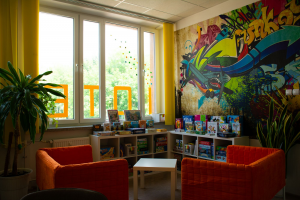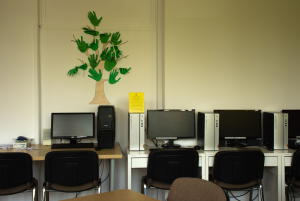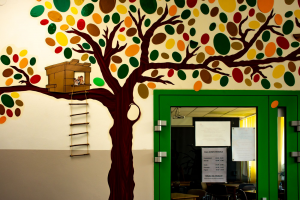Lessons from a Digital Traveller – interview with a Polish librarian
1 October 2021
Through the Digital Travellers project, we support people who are at risk of digital exclusion or have insufficient skills to use digital services and devices. In this project, we cooperate with libraries that carry out digital education activities aimed at people with special needs. We talk to Anna Zyskowska, a librarian from the “On Baleya St.” Library – a branch of the Public Library in the Ochota District of the Capital City of Warsaw about her experience from this project.
Agnieszka Koszowska: It seems that the Digital Travellers project turned out to be very necessary during the pandemic, when almost all of our lives (study, work, interpersonal relations or other personal affairs) moved online. And residents, especially the elderly, who do not feel confident in the digital world, had a much harder time. Did you notice that the digital education classes in your library were met with greater interest?
Anna Zyskowska: Our library is located in a neighbourhood where a lot of elderly people live. Some of them had already come to us for computer courses before. That is why we have quite a lot of interest in such activities.
AK: And were the classes also held online?
AZ: In our case, the classes were within the framework of the project started as in-person meetings. It was the moment of “loosening” the restrictions after lockdown, so I could invite a few people to one or two meetings at the library in order to find out what difficulties they had and what kind of skills they needed. I also showed them Zoom and Skype, and later we met online. That was my idea and it turned out to be good.
AK: So you first trained these people at meetings in a library, and only later did online meetings take place? Was it easier then?
AZ: For sure. Anyway, I thought earlier that seniors would be reluctant to such “experiments” as online meetings, but it worked fine. And I think it’s a good idea to do it this way – as “hybrid” classes.
AK: And later, during online meetings, did you teach them any specific digital services? Did you use the database of resources that was created as part of the project?
AZ: Yes, we used different materials. A topic that was very popular is safe online shopping. Another material from the database is “Don’t be fooled by fake news” – a very interesting topic. Seniors asked a lot of questions about this, because they are very interested in how to navigate this maze of information that comes to us from the Internet, and how to do it safely. Another useful topic from the database is: how to develop hobbies and interests through various digital resources. I used to conduct in-person classes on this subject before, but the ready-made materials help me a lot. First, I read and watched them, “digested” them and wondered how to pass this knowledge on to seniors, and then we also used this database at online meetings. Sometimes these are ready-made lessons that you can adapt to your needs, sometimes lectures that can be presented at a meeting, so this database is very cool and I’m going to use it also in future.
AK: Is there anything you have personally learned?
AZ: I recently started learning Canva because I didn’t use it before and was a bit afraid, but it turned out that there was a very nice simple presentation in which the different functions of this tool are explained step by step. I also learned Zoom by participating in the Digital Travellers training for librarians. Previously, I could not “zoom”, or, I could just connect, set up a microphone or a webcam, but during the training we used other options, such as how to divide into groups, how to let someone in to a meeting or other additional functions. And these are very useful skills.
AK: So it can be said that both your library and you personally have found this project useful? What benefits do you see from participating in it?
AZ: The benefits are huge. I had already conducted classes for seniors before, but I developed the program and prepared materials myself. In this project, however, I was able to use the database of resources, ready-made materials, and thus better plan training. In addition, we were able to exchange experiences during online meetings with other project participants, share advice, and this is also important.
I met, or rather heardand saw, online, with other people from this project, from Poland and from abroad, because I also participated in international online meetings. Exchanging experiences, inspiring each other, sometimes brainstorming and talking – this is very valuable, in my opinion. Sometimes only two or three people work in the library and there is a great need to talk to someone else, consult your ideas or be inspired by others.
AK: Thank you very much for the interview.


